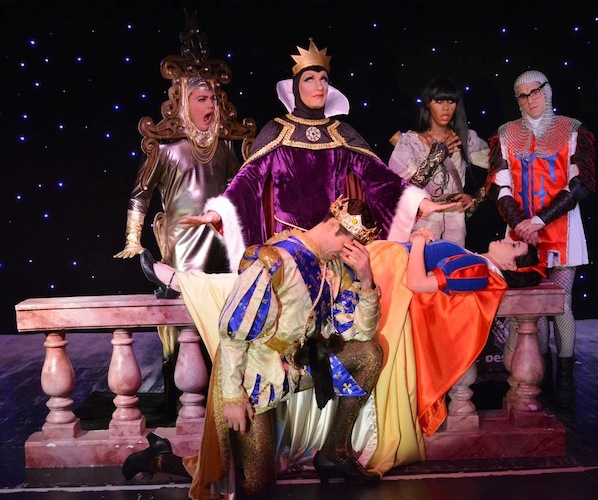Theater Review: “Snow White and the Seven Bottoms” — Smart, Stylish, Slick, and Hilarious
Ryan Landry has a sharp eye and ear for contemporary foibles, skewering stereotypes and pop culture icons with equal aplomb.
Snow White and the Seven Bottoms, by Ryan Landry. Presented by the Gold Dust Orphans at Machine, Boston, MA, through May 18.
By Terry Byrne
With the title Snow White and the Seven Bottoms, it’s easy to assume the latest offering from the Gold Dust Orphans might be particularly bawdy. But Ryan Landry’s latest fractured fairy tale is one of his best – slick, smart, and stylish, not to mention side-splittingly funny.
Landry has a sharp eye and ear for contemporary foibles, skewering stereotypes and pop culture icons with equal aplomb. In addition to the appearance of a terrifying “Kardashadragon,” there’s the inspired portrayal of the Bottoms as puppets operated and voiced by a terrific group of performers, most of whom are better known in their drag personas. Landry’s nod to the local club scene, combined with his fearless re-imagining of the “happy ever after” ending, give this old-fashioned story the perfect twist.
The core members of the Gold Dust Orphans have honed their considerable skills over the years. In this production they’ve kicked their stagecraft up another notch. Longtime director James P. Byrne brings Landry’s irreverent script to life with extraordinary style and pacing. Byrne uses every available inch of Machine’s performance space to create multiple settings: the palace of the evil queen; the forest, teeming with a hilarious assortment of dancing wildlife; and the cottage of the Seven Bottoms.
Scott Martino has outdone himself with the costumes for this show, creating an elaborate assortment of outfits that reference the fairy tale and then take off to another level. Landry’s wondrous appearance in the evil queen’s full regalia is an eyeful and a half, while Olive A. Nother’s dress-within-a-frame makes The Magic Mirror irresistible.
Paul Melendy, who nearly stole the Orphan’s holiday entry, It’s a Horrible Life, with his spot-on Jimmy Stewart impersonation, plays Prince Charming as a dashing and delightfully egocentric prig, so that it’s easy to see why he’s more attracted to The Magic Mirror than Snow White. Jessica Barstis, as Snow White, combines a gorgeous singing voice with a lovely sense of comic timing and an ability to play the innocent with adroit ease.
Over the years Landry has expanded his Gold Dust Orphans ensemble to serve his increasingly ambitious satiric vision of musical theater. The addition of Timothy Lawton as music director and Meredith Langdon as choreographer for this show increases the breadth and depth of the Gold Dust Orphan talent pool, adding considerably to the professional quality of the work. Lawton makes great use of the ensemble’s terrific vocalists, including Barstis, several of the Bottoms, and Lawton himself, who has a powerful baritone.
Langdon creates a wide array of dance moves, from a simple kick line and ensemble combinations to elaborate tap routines and a pas de deux on pointe.
Landry’s insouciant take on the classic tale of “Snow White” sparkles with his witty dialogue and his customary attention to detail – whether it’s his slyly sardonic comments on oh-so-current pop culture or amusing ‘ad-libs’ when faced with the occasionally malfunctioning prop. This anarchistic spirit inspires the entire Gold Dust Orphans ensemble, both on stage and behind the scenes, to take advantage of every opportunity to entertain.
No need for a magic mirror to tell us this production of Snow White and the Seven Bottoms is the fairest of them all.
Terry Byrne has been writing about the arts for nearly two decades. She has an MFA in Playwriting from Boston University and is a Resident Scholar at Brandeis University’s Women’s Studies Research Center.

